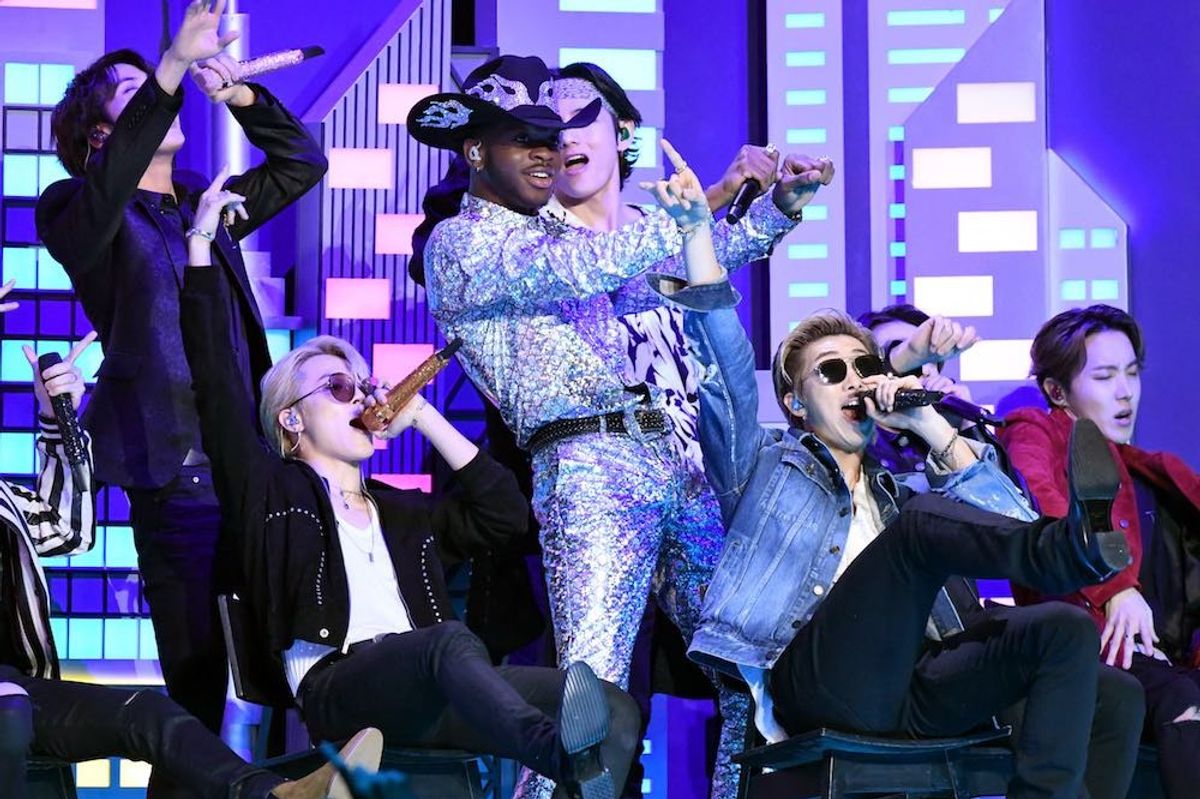 Photo Credit: Jeff Kravitz/FilmMagic
Photo Credit: Jeff Kravitz/FilmMagic
Underneath the sheen of bright lights and glamour, the Grammys grows more and more hollow each year, especially as it's plagued by controversy behind the scenes.
Each time the Grammys end, the same talking points resurface. The annual awards ceremony doesn't reflect the current landscape of music. Who is chosen as the recipient of the ceremony's awards — especially its top honors like Album of the Year, Record of the Year, and Song of the Year — often further proves that point. And critics are, yet again, left disappointed and frustrated at what's supposed to be music's biggest night.
The 2020 Grammys attempted to make some strides for progress. The night was filled with performances by women of varying genre — from Lizzo's flute-filled awards show-opening medley to Billie Eilish's stripped-down take of "When the Party's Over" — as well as memorable performances from queer Black artists like Lil Nas X and Tyler, the Creator that highlighted how great the ceremony can be when it lets its artists bring their creative vision to life. Most of the night's enthralling moments came from Black artists. When H.E.R. took the stage to perform "Sometimes," the combination of captivating stage shots and the artist's musical talent was a moment that felt like a celebration of music, as she coolly went back and forth between piano and guitar. Gary Clark Jr.'s live rendition of his political anthem "This Land" was jolting and invigorating, his meticulous melding of blues and rock captured brilliantly in his guitar solo. And say what you will about Alicia Keys as a host, but seeing her elevated above the crowd during her "Underdog" performance was one of the best scenes of live music the Grammys has offered in recent history.
That Black music was so present onstage, and that many of those performers are redefining the sounds of contemporary music by bringing genres together, you'd think that would also extend to the actual awards. But the Grammys still fail to celebrate Black music in that regard.
If critics are to believe the notion that the Grammys are nothing but a popularity contest, Black music should've been the recipients of some of the ceremony's biggest prizes. Lizzo's "Truth Hurts" and Lil Nas X's "Old Town Road" were inescapable last year, and their respective hits propelled them to mainstream success, culminating in them earning eight and six Grammy nominations, respectively. And yet, neither artist received any wins in its four major categories: Best Album, Record of the Year, Song of the Year, and Best New Artist. Instead, those awards all went to Eilish. At 18, she is now the youngest person and first woman to win the four main categories. Eilish was a safe choice; considering how past Grammys found itself criticized for failing to acknowledge the many talented women making music (in 2018, Alessia Cara was the only woman presented a solo Grammy award, taking home Best New Artist), choosing Eilish felt like a response to past failures. That she's so young also works in the Recording Academy's favor, as if to say, "Yes, we're primarily made up of old white men, but we're still hip to what the kids think is cool."
 Photo Credit: Frederic J. Brown BROWN via Getty Images
Photo Credit: Frederic J. Brown BROWN via Getty Images
It's also hard to not be cynical or skeptical of Eilish's wins — as well as the ceremony in its entirety — amid the controversy the Recording Academy is currently embroiled in. Earlier this month, CEO Deborah Dugan was abruptly placed on leave after the Academy’s board of trustees said an assistant had accused her of bullying. In response, Dugan — who had only held the position for five months after replacing former CEO Neil Portnow — denied the charge and filed a 46-page complaint to the Los Angeles Equal Employment Opportunity Commission. In the complaint, she claimed her removal was retaliation for pointing out a range of misconduct at the Academy. (Three weeks before her dismissal, Dugan sent a memo concerning the Academy's voting irregularities and financial mismanagement.) She also alleged that Joel Katz, the Academy's lawyer, sexually harassed her during her brief tenure and that Portnow had been accused of rape by an artist. Along with stating that "something was seriously amiss at the Academy," Dugan also said that the institution was being led with a "boys club mentality and approach."
"It's just such a culture of secrecy, of secret meetings and secret committees," Dugan said of the Academy to the Los Angeles Times. "I had done a presentation at the board meeting in November where I said, 'Let’s go from secrecy to transparency, from feeling like a castle to feeling of the people, from feeling elite to being of service.'"
Underneath the surface facade of progress the Academy seems to be trying to make, is an underbelly of systemic issues. That Dugan — the first woman to ever earn the position of the Academy's CEO — tried to fix that and was removed as a result, speaks to how regressive the institution continues to be.
At one point during the Grammys, Keys seemed to indirectly allude to the controversy happening behind the scenes in the Academy.
"We refuse the old systems, feel me on that," she said. "We want to be respected and safe in our diversity; we want to be shifting in realness and inclusivity. So tonight we want to celebrate the people, the artists who put themselves on the line and share their truth with us."
The Grammys could be that but it isn't, and judging by how it's being led by those that control it, it will never be.


 Photo Credit: Jeff Kravitz/FilmMagic
Photo Credit: Jeff Kravitz/FilmMagic Photo Credit: Frederic J. Brown BROWN via Getty Images
Photo Credit: Frederic J. Brown BROWN via Getty Images



